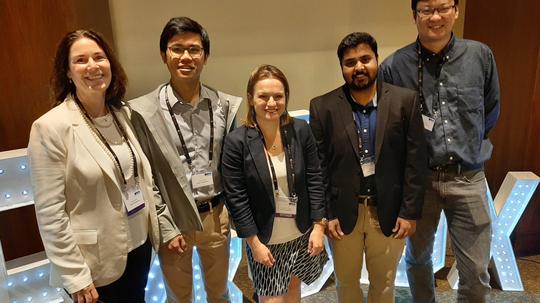
Elizabeth O'Day is a force to be reckoned with.
O'Day is the founder and CEO of Olaris, a local biotech startup developing artificial intelligence designed to determine the effectiveness of various drugs for individual patients. She is also the World Economic Forum co-chair of the Global Future of Biotechnologies, a former National Science Foundation Fellow and a project lead for the World Economic Forum's Precision Medicine initiative.
And, in her spare time, she has founded Lizzard Fashion, an apparel company that uses fashion to promote science, and Proyecto Chispa (Project Spark), a nonprofit that recycles electronics and uses the resale of parts to build computer centers in orphanages throughout the world. She also teaches metabolism and entrepreneurship at Boston College, where she earned her undergraduate degree.
Olaris, however, is where O'Day is currently directing most of her energy.
"We've nicknamed 2020 as our performing year," O'Day said in an interview with BostInno.
Founded in 2014, shortly after O'Day graduated with her Ph.D. in biological and biomedical sciences from Harvard, Olaris closed its Series A funding round in September last year at $4.2 million, bringing the startup's total funding to about $7.5 million as of January. That amount was increased last week by an undisclosed amount when Olaris announced it had received a grant from the Michael J. Fox Foundation for Parkinson’s Research.
The startup's mission is to bring AI-powered precision medicine to help treat a range of different diseases, beginning with metastatic breast cancer. To that end, O'Day and her team have developed a platform for measuring the metabolome using nuclear magnetic resonance spectroscopy to analyze biofluid samples. Olaris has developed custom non-uniform sampling techniques that dramatically increase the sensitivity and resolution, while also reducing the time required to collect the data. The idea is to identify biomarkers of disease in individual patients.
O'Day intends to make the product available through a laboratory-developed test (LDT), a type of in vitro diagnostic test that is designed, manufactured and used within a single laboratory.
"Let's say, heaven forbid, in the future, I get diagnosed with cancer," O'Day said. "I truly imagine a world where my doctor can send a blood sample to a lab, and we'll run it through our analysis and send back a report to both the physician and the patient and the patient. It will be like a tailored menu that will say, 'For Liz O'Day, at this moment in time, here are the drugs most likely to benefit you, and here are the drugs least likely to benefit you.' That should hopefully empower the physician and the patient to, together, design the most optimal treatment strategy for that individual."
For O'Day, this endeavor has always been personal. When she was a child, her older brother was diagnosed with cancer. Although he recovered completely, O'Day remembers the frustration she felt at her inability to help him while he was sick.
"All I was told to do was hope and pray that he got better," O'Day said. "As a fiery little kid, that just was not satisfying. I kept saying, 'Just fix him. We know this thing, cancer, is what's wrong with him. Just make him better.' It kind of left this taste in my mouth that I wanted to do something more. I wanted to cure cancer. That has been the only thing that I've ever wanted to do with my life."
Curing cancer became something of a monomania for O'Day. As an undergraduate at Boston College, she spent most of her time in an organic chemistry lab, beginning to work toward that goal. This theme continued throughout her education: She earned a master’s of philosophy in chemistry from the University of Cambridge, then her Ph.D. from Harvard University.
It was her Ph.D. work that led to the formation of Olaris. Her thesis ultimately became the platform that is now Olaris's flagship product. Once she had developed it, she realized that she needed to transition out of academia and into the business world: "I don't want my technology to sit in the lab," O'Day said. "I really want to get it out to patients as soon as possible."
O'Day and her team have spent the last six years hopping from incubator to incubator: Cambridge BioLabs, Harvard's Life Lab, Alexandria LaunchLabs and the Z Park Boston Incubator and Accelerator. Olaris is currently housed in the AstraZeneca Incubator at the Boston BioHub.
"When you're starting a biotech, there's just so much stuff you need, from capital to equipment to permits," O'Day said. "For someone like me—a young, first-time female scientist trying to start this—the ability to raise the capital to get those resources is not likely. So the incubator route really made this feasible."
Olaris currently has seven full-time employees and is hiring for five more positions, including a CFO. The startup is still in the research and development phase.
Correction: This article previously stated that O'Day is an advisor for the National Institutes of Health’s Precision Medicine Initiative, not a project lead for the World Economic Forum's Precision Medicine initiative. We regret the error.








